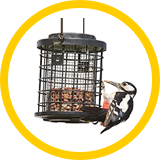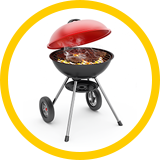MNR Bear-Wise Program

Additional Articles about Bear Encounters:
IMPORTANT NUMBERS
Who to contact
Not every bear sighting is an emergency situation. Here is who to call if you encounter a bear.
Emergency situations
Call 911 or your local police if a bear poses an immediate threat to personal safety and exhibits threatening or aggressive behaviour, such as:
- enters a school yard when school is in session
- stalks people and lingers at the site
- enters or tries to enter a residence
- wanders into a public gathering
- kills livestock/pets and lingers at the site
Police will respond first to an emergency situation, but may request assistance from the Ministry of Natural Resources and Forestry during daylight hours.
Non-emergency encounters
Call the toll-free Bear Wise reporting line at 1-866-514-2327 (TTY 705-945-7641 ) if a bear:
- roams around or checks garbage cans
- breaks into a shed where garbage or food is stored
- is in a tree
- pulls down a bird feeder or knocks over a barbecue
- moves through a backyard or field but does not linger
This line operates 24 hours a day, seven days a week, from April 1 to November 30.
BE BEAR WISE THIS SEASON
Anyone living in Northern Ontario will tell you that living alongside wildlife is a great experience. Imagine sitting on your porch with your morning coffee and seeing a deer drinking from a stream or a bear and her cubs playing in a hayfield!! This is reality for us Northerners, especially when living in a rural area. As beautiful as this is there are also certain precautions we have to take to ensure that wildlife are just observed. An unsuspecting person could find themselves in a dangerous and potentially lethal situation if certain precautions are not taken to ensure that Bears and other wild animals are not purposefully or accidentally lured to your home. Below are tips to help you avoid a bad encounter and help you live in peace amongst all the beauty that is Northern Ontario.
BLACK BEAR FACTS
- Black bears actively feed from mid April to late fall
- In late summer and early fall some bears actively feed for 20 hours a day, ingesting as much as 20,000 calories.
- While preparing for the winter hibernation bears normally double their body weight
- Black bears will travel up to 100 km's to find other food (garbage) if natural food is not available.
- Once they know where a non-natural food source is located, they will return again and again.
HOME SAFETY
To avoid bear encounters, follow these Bear Wise tips.

Garbage:
- put garbage out only on the morning of garbage day, not the night before
- put meat scraps in the freezer until garbage day
- put garbage in containers that have tight-fitting lids and store it in a bear-proof location such as your basement or a sturdy garage
- frequently wash garbage cans and recycle containers and lids with a strong-smelling disinfectant, such as bleach
- take garbage to the dump often, if you do not have curbside pick-up

Bird feeders:
- fill bird feeders only through the winter months
- put away feeders in the spring and instead, offer birds natural alternatives (for example, flowers, nesting boxes and fresh water)

Barbecue:
- burn off food residue and wash the grill right away
- empty the grease trap every time you barbecue
- remove all utensils, dishes and food after eating
- be aware that cooking odours can attract bears

Fruits and berries:
- pick all ripe and fallen fruit from trees and shrubs on your property
- plant non-fruit bearing trees and shrubs

Pet food:
- do not leave pet food outdoors, in screened-in areas or porches

Dogs:
- leash your dog(s) when walking through communities or out in bear country to reduce the potential of dogs harassing a black bear or of being attacked by one
- unleashed dogs may instigate a chase response that may lead the bear back to you
- check your yards for the presence of a black bear before letting your dogs out
PLEASE DO NOT FEED THE BEARS
Bears should never obtain human food, pet/livestock feed or garbage. Bears that receive these “food rewards” may become aggressive towards humans or cause property damage. To protect people and their property these bears may have to be destroyed. Wild bears have a natural fear of humans and will attempt to avoid people and developed area fed bears do not. They rely on natural foods such as berries and fish. Fed bears will abandon vital food sources for human foods and garbage and will quickly become conditioned to hand outs and will teach their cubs to do the same. There is also the increased chance of vehicle animal accidents as bears fed along the roads tend to stay near the road.
Avoid bear-human interactions
Alert bears to your presence so they can avoid you. Make noise, such as singing, whistling or talking while in areas with restricted visibility or with high background noise, such as near streams and waterfalls.
While outdoors:
- travel in groups of two or more—people who travel alone are most vulnerable
- scan your surroundings and do not wear music headphones
- watch for signs of bear activity such as tracks, claw marks on trees, flipped-over rocks or fresh bear droppings
- leash your dog, as uncontrolled, untrained dogs may actually lead a bear to you
- pay attention, especially if you are working, gardening or berry picking
- rise slowly if you are in a crouched position so that you don't startle nearby bears
- avoid strong fragrances that may cause a bear to be curious
- put any food you are carrying in sealed containers in your pack.
WHAT TO DO IF YOU SEE OR ENCOUNTER A BEAR ON YOUR PROPERTY
Every encounter with a black bear is unique. The following information is what experts recommend you do. There is no guarantee that what works in one instance will work in another.
Black Bear Safety Basics
- Never approach the bear to get a better look.
- DO NOT attempt to feed a bear.
- Anticipate and avoid encounters.
- Know what to do if you encounter a bear.
- Learn about bears and their behavior.
- When outdoors, supervise children and never leave pets unattended.
If you encounter a black bear
When bears are caught off guard, they are stressed, and usually just want to flee.
Stop. Do not panic. Remain calm.
Generally, the noisier the bear is, the less dangerous it is, provided you do not approach. The noise is meant to “scare” you off and acts as a warning signal.
Do
- Slowly back away while keeping the bear in sight and wait for it to leave.
- If the bear does not leave, throw objects, wave your arms and make noise with a whistle or air horn.
- Prepare to use bear spray.
- If you are near a building or vehicle get inside as a precaution.
- Drop any food you may be carrying and slowly move away.
- If a bear is in a tree, leave it alone. Leave the area. The bear will come down when it feels safe.
Do not
- Run, climb a tree or swim.
- Kneel down.
- Make direct eye contact.
- Approach the bear to get a better look.
- Attempt to feed a bear.
Bear warning signs
Black bear attacks are extremely rare.
A threatened or predatory black bear will give off warning signs to let you know you are too close. A black bear standing on its hind legs is not a sign of aggressive behaviour. The bear is trying to get a better look at you or catch your scent.
A defensive bear
A bear that feels threatened will:
- salivate excessively and exhale loudly
- make huffing, moaning, clacking and popping sounds with its mouth, teeth and jaws
- lower its head with its ears drawn back while facing you
- charge forward, and/or swat the ground with its paws (known as a ‘bluff' charge)
A predatory bear
The bear will approach silently, usually in rural or remote areas, and may continue to approach regardless of your attempts to deter them by yelling or throwing rocks. If the bear attacks:
- use bear spray
- fight back with everything you have
- do not play dead unless you are sure a mother bear is attacking in defence of her cub
After the bear leaves
- Report the bear encounter by calling 1-866-514-2327 (TTY 705-945-7641 )
- Tell your neighbours about bear activity in the area.
- If the bear was eating non-natural food (such as garbage or bird food), remove or secure the item.
When to use self defence
If you have tried everything possible to get a bear to leave your property and you are afraid for your safety, you have the right to protect yourself and your property.
Killing a bear in self-defence must be an action of last resort.
Any action you take must be done:
- according to applicable laws (for example, discharging a firearm by-laws)
- safely
- in the most humane way possible
You do not need a hunting licence to kill a bear in self-defence. If you kill a bear and do not intend to keep it, you must report it immediately to your local Ministry of Natural Resources and Forestry office.
If you kill a bear and want to keep it, you must register for a Notice of Possession with the Ministry of Natural Resources and Forestry.
The above information can be found on the MNR website at https://www.ontario.ca/page/prevent-bear-encounters-bear-wise

